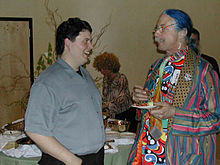Conference on World Affairs
The Conference on World Affairs (CWA for short) is an annual public and free conference on international affairs and numerous other topics that takes place in Boulder , Colorado (USA) . It took place for the first time in 1948 and is organized by the University of Colorado (Boulder) .
Howard Higman , professor of sociology at that university, founded the CWA and directed it until 1995. The conference was revived in 1996. James Palmer took over the management for sixteen years.
Although the conference was initially limited to international affairs, the occasion changed under Higman. The core of the congress consists of panel discussions , which usually have three to six participants and can hold between 50 and 2000 spectators. The topics are almost unlimited, including music , art , literature , environmental protection , business and management , science , journalism , diplomacy , technology , spirituality , film industry , pop culture , politics , medicine and human rights . Half of the invited panelists consist of experts in the respective field, while the other half is invited to contribute their perspectives and thoughts as outsiders. For each occasion, two to three weeks in advance, a single line title is given; there are no other specifications about the topic of conversation.

Each year over a hundred participants are invited to hold over 200 sessions. The total number of participants in the CWA 2010 was estimated at over 92,000 people. Over the years there have been names like Patch Adams , Betty Dodson , Buckminster Fuller , Adam Hochschild , Arianna Huffington , Andy Ihnatko , Molly Ivins , Henry Kissinger , Paul Krugman , George McGovern , Ralph Nader , Yitzhak Rabin , Eleanor Roosevelt , Studs Terkel and Ted Turner on panelist list.
Cinema interruptus
One of the better known events at the CWA is the "Interrupted Cinema", which has been held since 1975 and was directed for many years by the well-known film critic Roger Ebert , who died in 2013 . Ebert selected one film each year to be shown at the beginning of an afternoon at the CWA. This film was then discussed over the next four afternoons, for two hours each day. Roger Ebert as well as any listener could interrupt the film at any time and discuss any aspect of the film. In a blog post from August 2008 he described the origin of the event as follows:
“For me, this all started around 1969 when I started teaching a fine arts film class at the University of Chicago. I knew a Chicago film critic, teacher, and scheduler named John West who lived in an amazing apartment - filled with rolls of film, projectors, books, posters, and stills. 'You know how football coaches study movies of games with their 16mm projectors?' He asked me. 'You can use the same approach to study films. Just stop the movie and think about what you are seeing. You should try it out with your film class. '
I did this. The results were far beyond my expectations. I wasn't the teacher and my students weren't spectators, we formed a community. The basic rules: Everyone could 'stop!' shout and discuss what was in the picture or what had just occurred to him. Several years later, when I started doing these shot-by-shots at the Conference on World Affairs in Boulder, the conference founder, Howard Higman, described the process as 'democracy in the dark'. He later gave it a name: Cinema Interruptus. It may sound grueling, but actually it was exciting and almost hypnotic. For more than thirty years I worked my way through a film for two hours an afternoon in Boulder, and the sessions had to be relocated to an auditorium to cope with the rush of nearly a thousand people. "
When Roger Ebert was recovering from his cancer treatments, Jim Emerson , editor of the RogerEbert.com website and CWA participant, took over the moderation of the event. Ebert returned in 2009 and 2010, but mainly contributed comments via a computer voice. In 2011, Ebert announced that he would no longer return to the CWA, and Emerson took over the leadership of Cinema Interruptus .
Web links
References
- ↑ http://www.imdb.com/name/nm0403322/ (accessed on January 30, 2016)
- ^ Roger Ebert: "How to read a movie." http://www.rogerebert.com/rogers-journal/how-to-read-a-movie (accessed on January 27, 2016)